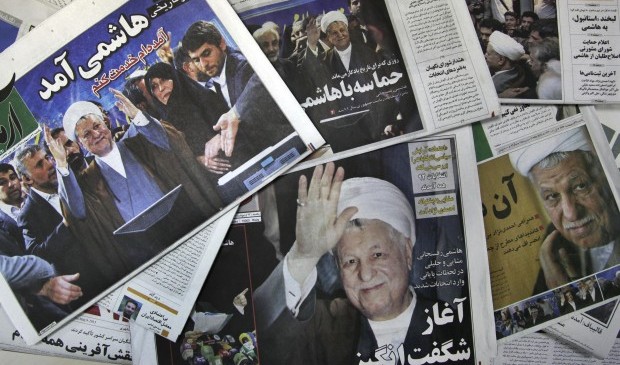London, Asharq Al-Awsat—The sudden death of Parviz Isfahani, an Iranian publisher and editor, brought together more than 300 Iranian “cultural workers” in exile for a memorial service in London with speeches denouncing the current wave of repression in Iran.
Isfahani died, aged 69, of complications following a heart attack and was buried in a London graveyard on February 13. He was publisher and editor-in-chief of Nimrooz, one of the two popular weeklies produced by Iranian exiles in London and distributed across the globe.
Nimrooz, which means “Midday” in Persian, was launched in February 1989 in response to the fatwa issued by the late Ayatollah Khomeini calling for the murder of British–Indian novelist Salman Rushdie. The weekly said in an editorial that Khomeini represented neither the Iranian intellectuals nor the people at large.
“Iranians don’t issue death fatwas against people we do not agree with,” Isfahani said. “They answer a novel with a novel, a poem with a poem, and a polemic with a polemic.”
“Khomeini does not represent Iranian values,” the paper asserted. “He represents an alien cult based on [a] deep enmity for everything Iranian.”
Over the years Nimrooz attracted dozens of writers from all parts of the political and ideological spectrum.
Former high officials of the Shah’s regime, former Communists, ultra-nationalists, and former supporters of Khomeini struck by buyer’s remorse all wrote for Nimrooz. The weekly also offered a platform to journalists who had fled Iran after spending some time in Khomeini’s prisons.
Isfahani himself had also been jailed by the mullahs for more than four years, during part of which he produced a weekly newspaper for his fellow prisoners. Isfahani had started his career in Iran as the publisher of a magazine devoted entirely to crossword puzzles.
His passion for the pastime also led him to compile a dictionary of crossword terms and words.
His switch to political journalism was directly caused by what he later described as “Iran’s tragedy under the mullahs.”
At one point Nimrooz had over 100,000 readers in more than 50 countries, and was regarded as a forum in which diverse Iranian views could be expressed. Many of Isfahani articles found a much wider readership inside Iran, distributed in “samizdat” form (a Soviet-era hand-to-hand practice used to evade censorship). The weekly attracted even more readers when it went online in 2006.
According to those who knew him Isfahani was a deeply sympathetic man, always calm and polite. He was honored in France and received the Humanitarian Action Prize at a special ceremony in the French Senate.
At the ceremony in London, Siavash Avesta, a TV talk-show host in Paris, spoke of Isfahani’s “deep love of Iran and attachment to human values.” Hadi Khorsandi, one of Iran’s most popular poets, lamented the fact that so many talented Iranians had to leave their homeland, producing the biggest “brain drain” in human history, according to a World Bank report. Ali-Reza Nurizadeh, a poet and popular TV talk-show host, spoke of his years of contributions to Nimrooz. Massoud Behnoud of the Persian service of the BBC who had contributed to Nimrooz for years before fleeing Iran spoke of his admiration for Isfahani’s readiness to let diverse views be freely expressed in his weekly. Reza Qassemi, president of the Iranian Centre in London, recalled Isfahani’s contribution to networks helping Iranians fleeing from the Khomeinist terror.
I spoke at the ceremony of “the long history of Iranian press in exile” dating back to the 19th century and expressed solidarity with “our journalist colleagues suffering under an oppressive regime in Iran.”

